"Families is where our nation finds hope, where wings take dream."
LaCross, Wisconsin
October 18, 2000
Friday, April 25, 2008
according to George W. Bush
posted by carroll atlee hardin cadden on 4/25/2008 10:35:00 AM 0 comments
labels George W. Bush, quotes
Wednesday, April 23, 2008
The Carol Burnett Show's: "Family Charades": Part 2
posted by carroll atlee hardin cadden on 4/23/2008 01:17:00 PM 0 comments
labels Carol Burnett Show, charades
The Carol Burnett Show's "Family Charades": Part 1
posted by carroll atlee hardin cadden on 4/23/2008 01:10:00 PM 0 comments
labels Carol Burnett Show, charades
The Carol Burnett Show's "Went With the Wind": Part 2
posted by carroll atlee hardin cadden on 4/23/2008 01:00:00 PM 0 comments
labels Carol Burnett Show, Gone With the Wind
The Carol Burnett Show's "Went With the Wind": Part 1
A total classic!
posted by carroll atlee hardin cadden on 4/23/2008 12:53:00 PM 0 comments
labels Carol Burnett Show, Gone With the Wind
Sunday, April 20, 2008
Carroll
posted by carroll atlee hardin cadden on 4/20/2008 08:17:00 PM 0 comments
labels Carroll Atlee Hardin Cadden
bacterial name
My bacterial infection is:
My bacterium classification is Carboxydocella Acetofilamentum.
Take The Bacterial Name Generator today!
Created with Rum and Monkey's Name Generator Generator.
posted by carroll atlee hardin cadden on 4/20/2008 07:12:00 PM 0 comments
my Morse code name
-.-. .- .-. .-. --- .-.. .-.. / .- - .-.. . . / .... .- .-. -.. .. -. / -.-. .- -.. -.. . -.
posted by carroll atlee hardin cadden on 4/20/2008 07:06:00 PM 0 comments
labels Carroll Atlee Hardin Cadden, Morse code, name
How much is your blog worth?

My blog is worth $1,129.08.
How much is your blog worth?
posted by carroll atlee hardin cadden on 4/20/2008 07:01:00 PM 0 comments
labels Blogger, Technorati
CA11HC






Zombie Letters from e-zombie.com
posted by carroll atlee hardin cadden on 4/20/2008 06:23:00 PM 0 comments
my own Geo Greeting
http://www.geogreeting.com/view.html?ymkBByvvUkDvooUrkBnsxUmknnox
posted by carroll atlee hardin cadden on 4/20/2008 06:12:00 PM 0 comments
labels Carroll Atlee Hardin Cadden
"Carroll" in Chinese
posted by carroll atlee hardin cadden on 4/20/2008 04:56:00 PM 0 comments
labels calligraphy, Carroll, Chinese
Chien Guevara!
posted by carroll atlee hardin cadden on 4/20/2008 04:51:00 PM 0 comments
labels bulldog, Che Guevara, Matilda
Matilda!
posted by carroll atlee hardin cadden on 4/20/2008 03:20:00 PM 0 comments
labels English bulldog, Matilda Sally Cadden
Friday, April 18, 2008
Macintosh Spider Pig
posted by carroll atlee hardin cadden on 4/18/2008 03:02:00 PM 0 comments
labels Apple, Homer, Macintosh, Simpsons, Spider Pig
new Steve Madden shoe
posted by carroll atlee hardin cadden on 4/18/2008 02:51:00 PM 0 comments
labels shoes, Steve Madden
Walter Mercado
I've been intrigued by him since seeing him on Spanish-language TV in Chicago. Walter is a Puerto Rican astrologist.
posted by carroll atlee hardin cadden on 4/18/2008 02:46:00 PM 0 comments
labels astrology, Puerto Rico, Walter Mercado
Monday, April 14, 2008
South Park's "Guitar Queer-O"
http://www.southparkzone.com/episodes/1113/Guitar-Queer-o.html
posted by carroll atlee hardin cadden on 4/14/2008 07:23:00 PM 0 comments
labels Guitar Hero, South Park
Saturday, April 12, 2008
Rob and Big: Meaty on a Sugar High
What are those NOISES?! I HAVE an English bulldog and I've never heard anything like THAT! :-D
posted by carroll atlee hardin cadden on 4/12/2008 02:36:00 PM 0 comments
labels donut, English bulldog, Meaty, Rob and Big
SAWWRY!, part 2
posted by carroll atlee hardin cadden on 4/12/2008 09:48:00 AM 0 comments
labels board game, Carol Burnett Show, Sorry
SAWWRY!
posted by carroll atlee hardin cadden on 4/12/2008 09:43:00 AM 0 comments
labels board game, Carroll Burnett Show, Sorry
Thursday, April 10, 2008
responsible president
posted by carroll atlee hardin cadden on 4/10/2008 09:08:00 AM 0 comments
labels George W. Bush, president
Wednesday, April 09, 2008
praying mantis
posted by carroll atlee hardin cadden on 4/09/2008 10:53:00 AM 0 comments
labels insect, praying mantis
elephant paints self portrait!
posted by carroll atlee hardin cadden on 4/09/2008 10:38:00 AM 0 comments
Wednesday, April 02, 2008
freak chins!
Igor and Grichka Bogdanoff, two French physicists. Have they learned nothing from Jocelyne Wildenstein?!





posted by carroll atlee hardin cadden on 4/02/2008 02:47:00 PM 0 comments
Tuesday, April 01, 2008
composers' political compass
 Composers' Political Compass
Composers' Political Compass
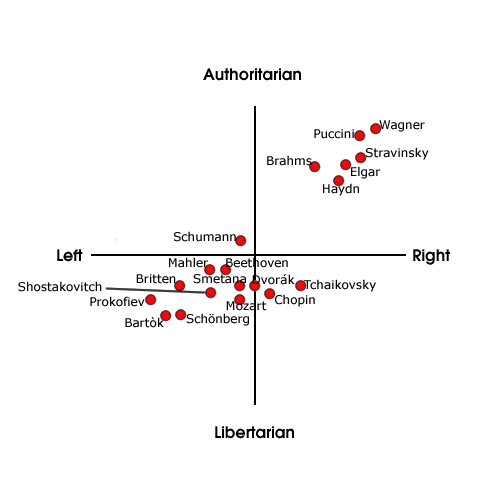
posted by carroll atlee hardin cadden on 4/01/2008 10:16:00 AM 0 comments
labels composers, music, Political Compass, politics
United Kingdom politics
 UK Parties 2008
UK Parties 2008
Firstly, a few words about popular political terms.
Once you accept that left and right are merely measures of economic position, the "extreme right" refers to extremely liberal economics that may be practised by social authoritarians or social libertarians.
Similarly, the "extreme left" identifies a strong degree of state economic control, which may also be accompanied by liberal or authoritarian social policies.
It's muddled thinking to simply describe the likes of the British National Party as "extreme right". The truth is that on issues like health, transport, housing, protectionism and globalisation, their economics are left of Labour, let alone the Conservatives. It's in areas like police power, military power, school discipline, law and order, race and nationalism that the BNP's real extremism - as authoritarians - is clear.
This mirrors France's National Front. In running some local governments, they reinstated certain welfare measures which their Socialist predecessors had abandoned. Like similar authoritarian parties that have sprung up around Europe, they have come to be seen in some quarters as champions of the underdog, as long as the underdog isn't Black, Arab, gay or Jewish ! With mainstream Social Democratic parties adopting - reluctantly or enthusiastically - the new economic libertarian orthodoxy (neo-liberalism), much of their old economic baggage has been pinched by National Socialism. It's becoming the only sort of socialism on offer. Election debates between mainstream parties are increasingly about managerial competence rather than any clash of vision and economic direction.
In the United States, the voices of dissent over unfettered market forces (ie extreme right economics) are heard from social authoritarians like Pat Buchanan as well as social liberals like Ralph Nader.
As an example, take a look at the ground that the main English parties in the UK's 2003 local elections (May 1) occupied in reality. The difference between the BNP and the Greens in economics isn't great, but there's a huge gap on the social scale. Neither scale, however, reveals enormous distances between the Conservatives and New Labour.

In the chart below, we look at the three largest UK parties and the positions that they've occupied on The Political Compass in recent years. We see that New Labour, for example, is actually significantly to the right of the pre-Thatcher Conservative Party. The change under Gordon Brown's leadership is one of style rather than substance, with the Blairite agenda continuing in all but name. As the centre of political gravity moves generally rightwards, the Liberal Democrats, who have held the most consistent ground, now occupy similar economic turf to the other parties, while maintaining a markedly greater concern for civil liberties. Although David Cameron is popularly perceived as "less right wing" than other recent Tory leaders, his real difference is on the social rather than the economic scale.
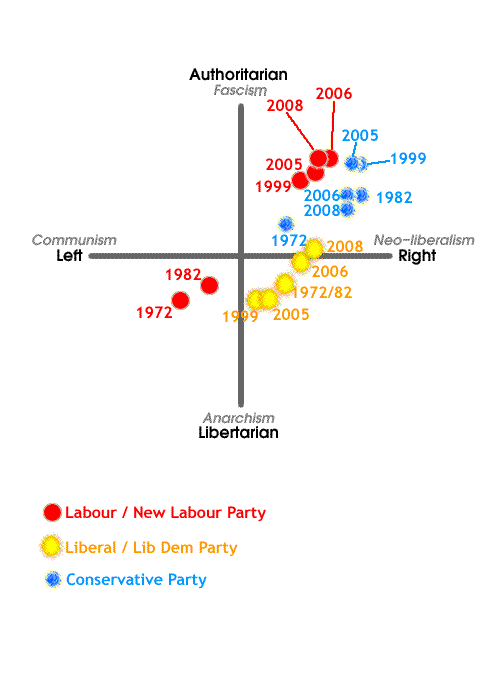
In 2008, we're hearing more than ever from politiicians that 'right' and 'left' are no longer meaningful terms. To the contary, they're as meaningful as ever, providing that it's understood that they're simply defining economic positions. However, with all the main parties embracing to a greater or lesser extent the prevailing neoliberal economic orthodoxy, it's increasingly - and embarrassingly - difficult for them to define their economic differences. No wonder they're anxious to scrap this measure !
Voter turnout is highest when ideological differences are most significant. This helps explain why the voter turnout is lower in the US than in all other western democracies , most of which have a multiplicity of parties and proportional representation. In the UK, voter turnout may continue to fall to US levels. Lowering the voting age isn't likely to excite participation in elections when the choice is less and less to do with a clash of visions than mere managerial competence. And without those traditionally big choices, one might well wonder where this is going to ultimately leave democracy.
posted by carroll atlee hardin cadden on 4/01/2008 10:14:00 AM 0 comments
labels Political Compass, politics, U.K., United Kingdom
Irish politics 2008
 IRISH PARTIES 2007
IRISH PARTIES 2007

Given that Fianna Fáil and Fine Gael are grounded in history rather than ideology, their Political Compass positions posed a particular challenge. However our chart reflects Fine Gael's slightly business friendlier posture and Fianna Fáil's deeper attachment to traditional social attitudes.
Ideology is more distinct in the smaller parties,with Labour following most of its sister parties abroad by accepting the prevailing market economy, though cloaking it in social democratic language. This leaves the Socialists keeping the red flag flying and the Greens offering a sort of decentralised Socialism Lite. Like Liberal parties throughout Europe, the Progressive Democrats combine neoliberal economics with comparatively liberal social policies.
We're not about to predict the outcome of the election in Ireland, which, as likely as not, will result in a coalition of rather strange bedfellows.
posted by carroll atlee hardin cadden on 4/01/2008 10:13:00 AM 0 comments
labels Ireland, Political Compass, politics
U.S. primaries 2008
 US Primaries 2008
US Primaries 2008
In response to many requests, not only from Americans, The Political Compass™ has charted the most prominent names in the 2008 US Primaries. They have been evaluated through scrutiny of public statements, manifestos, interviews and, crucially, voting records. Our apologies for those not included.
It is important to recognise that The Political Compass™ is a continuum rather than consisting of hard and fast quadrants. For example, Ron Paul on the social scale is actually closer to Dennis Kucinich than to many figures within his own party. But on the economic scale, they are, of course, far apart.
When examining the chart it's important to note that although most of the candidates seem quite different, in substance they occupy a relatively restricted area within the universal political spectrum. Democracies with a system of proportional representation give expression to a wider range of political views. While Dennis Kucinich and Ralph Nader are depicted on the extreme left in an American context, they would simply be mainstream social democrats within the wider political landscape of Europe. Similarly, Hillary Clinton is popularly perceived as a leftist in the United States while in any other western democracy her record is that of a mainstream conservative.
Perhaps the most breath-taking u-turn in the primaries so far belongs to Mike Gravel, a left-leaning Democrat and undoubted civil libertarian who has now put his lot in with the Libertarian Party. On the social scale this doesn't represent much of a leap, but economically the mercurial Mr. Gravel, a long-standing champion of universal health care and a redistributive economy, has vaulted from social democracy to a radical neo-liberal platform well to the right of most Republicans.
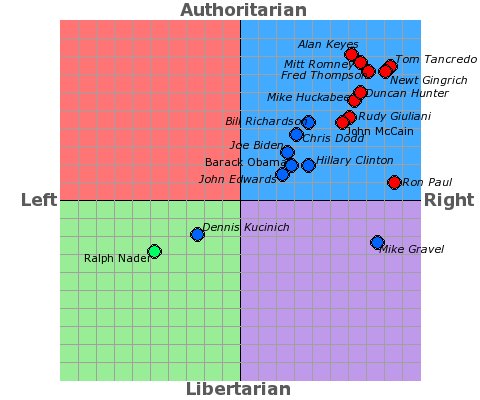
posted by carroll atlee hardin cadden on 4/01/2008 10:11:00 AM 0 comments
labels Political Compass, politics, primaries
my political compass again
About The Political Compass™
In the introduction, we explained the inadequacies of the traditional left-right line.
In the introduction, we explained the inadequacies of the traditional left-right line.

If we recognise that this is essentially an economic line it's fine, as far as it goes. We can show, for example, Stalin, Mao Tse Tung and Pol Pot, with their commitment to a totally controlled economy, on the hard left. Socialists like Mahatma Gandhi and Robert Mugabe would occupy a less extreme leftist position. Margaret Thatcher would be well over to the right, but further right still would be someone like that ultimate free marketeer, General Pinochet.
That deals with economics, but the social dimension is also important in politics. That's the one that the mere left-right scale doesn't adequately address. So we've added one, ranging in positions from extreme authoritarian to extreme libertarian.
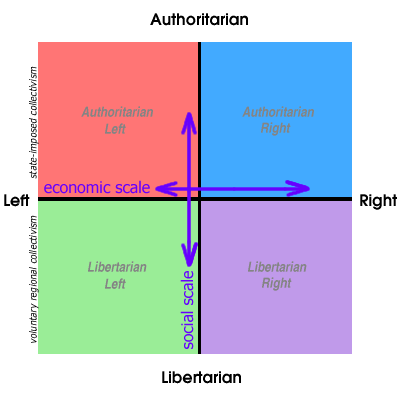
Both an economic dimension and a social dimension are important factors for a proper political analysis. By adding the social dimension you can show that Stalin was an authoritarian leftist (ie the state is more important than the individual) and that Gandhi, believing in the supreme value of each individual, is a liberal leftist. While the former involves state-imposed arbitary collectivism in the extreme top left, on the extreme bottom left is voluntary collectivism at regional level, with no state involved. Hundreds of such anarchist communities exisited in Spain during the civil war period
You can also put Pinochet, who was prepared to sanction mass killing for the sake of the free market, on the far right as well as in a hardcore authoritarian position. On the non-socialist side you can distinguish someone like Milton Friedman, who is anti-state for fiscal rather than social reasons, from Hitler, who wanted to make the state stronger, even if he wiped out half of humanity in the process.
The chart also makes clear that, despite popular perceptions, the opposite of fascism is not communism but anarchism (ie liberal socialism), and that the opposite of communism ( i.e. an entirely state-planned economy) is neo-liberalism (i.e. extreme deregulated economy)
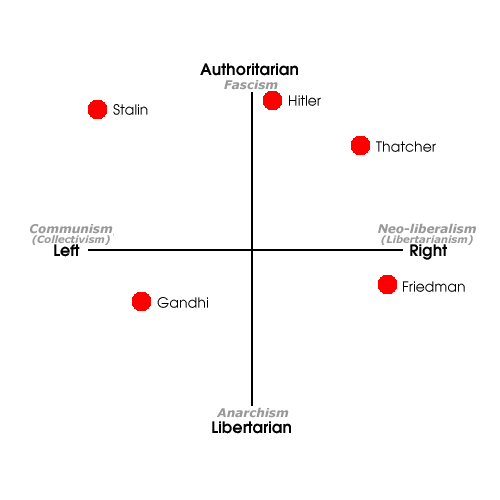
The usual understanding of anarchism as a left wing ideology does not take into account the neo-liberal "anarchism" championed by the likes of Ayn Rand, Milton Friedman and America's Libertarian Party, which couples social Darwinian right-wing economics with liberal positions on most social issues. Often their libertarian impulses stop short of opposition to strong law and order positions, and are more economic in substance (ie no taxes) so they are not as extremely libertarian as they are extremely right wing. On the other hand, the classical libertarian collectivism of anarcho-syndicalism ( libertarian socialism) belongs in the bottom left hand corner.
In our home page we demolished the myth that authoritarianism is necessarily "right wing", with the examples of Robert Mugabe, Pol Pot and Stalin. Similarly Hitler, on an economic scale, was not an extreme right-winger. His economic policies were broadly Keynesian, and to the left of some of today's Labour parties. If you could get Hitler and Stalin to sit down together and avoid economics, the two diehard authoritarians would find plenty of common ground.
Your political compass
Economic Left/Right: -5.75
Social Libertarian/Authoritarian: -6.62
posted by carroll atlee hardin cadden on 4/01/2008 10:09:00 AM 0 comments
labels Political Compass, politics
my enneagram
Your Score: 4- the Individualist
Thanks for taking the test !

you chose BY - your Enneagram type is FOUR (aka "The Romantic")
"I am unique"
Romantics have sensitive feelings and are warm and perceptive.
How to Get Along with Me
- Give me plenty of compliments. They mean a lot to me.
- Be a supportive friend or partner. Help me to learn to love and value myself.
- Respect me for my special gifts of intuition and vision.
- Though I don't always want to be cheered up when I'm feeling melancholy, I sometimes like to have someone lighten me up a little.
- Don't tell me I'm too sensitive or that I'm overreacting!
What I Like About Being a FOUR
- my ability to find meaning in life and to experience feeling at a deep level
- my ability to establish warm connections with people
- admiring what is noble, truthful, and beautiful in life
- my creativity, intuition, and sense of humor
- being unique and being seen as unique by others
- having aesthetic sensibilities
- being able to easily pick up the feelings of people around me
What's Hard About Being a FOUR
- experiencing dark moods of emptiness and despair
- feelings of self-hatred and shame; believing I don't deserve to be loved
- feeling guilty when I disappoint people
- feeling hurt or attacked when someone misundertands me
- expecting too much from myself and life
- fearing being abandoned
- obsessing over resentments
- longing for what I don't have
FOURs as Children Often
- have active imaginations: play creatively alone or organize playmates in original games
- are very sensitive
- feel that they don't fit in
- believe they are missing something that other people have
- attach themselves to idealized teachers, heroes, artists, etc.
- become antiauthoritarian or rebellious when criticized or not understood
- feel lonely or abandoned (perhaps as a result of a death or their parents' divorce)
- help their children become who they really are
- support their children's creativity and originality
- are good at helping their children get in touch with their feelings
- are sometimes overly critical or overly protective
- are usually very good with children if not too self-absorbed
Renee Baron & Elizabeth Wagele
The Enneagram Made Easy
Discover the 9 Types of People
Harper SanFrancisco, 1994, 161 pages
You liked the test?
so S P R E A D I T ! tell everyone!!! (use Quick-Paste below)
you wanna know MORE?
so check out, what Wikipedia says about your type...
...even more you'll find in Google
or do you prefer to
 |
You are not completely happy with the result?!
You chose BY
Would you rather have chosen:
My test tracked 2 variables How you compared to other people your age and gender:
You scored higher than 39% on ABC
You scored higher than 53% on XYZ
posted by carroll atlee hardin cadden on 4/01/2008 09:45:00 AM 0 comments
labels BY, enneagram, individualist
my political bent
| You are a Social Liberal (78% permissive) and an... Economic Liberal (26% permissive) You are best described as a:
Link: The Politics Test on Ok Cupid Also : The OkCupid Dating Persona Test |
Explanation Of Results
We wanted to get beyond the two catch-alls of American politics, the Democratic and Republican parties, and see where people actually stand. Parties can bring together people with marginally differing values and make collective action easier. But party platforms can misrepresent their constituents, and blind loyalty to a party can convince individuals to harbor inconsistent views.
 |
The goal of this test was to exactly classify your personal politics, without the traditional labels. We avoided the edgy party issues and focused on fundamental values. Your score is a measure of what you believe in, economically and socially.
Higher permissiveness, on either axis, indicates a "live and let live" philosophy. Of course, we're almost conditioned in America, "Land of the Free", to think positively of such a philosophy. But practically speaking, permissiviness (or its opposite, regulation) can create any number of outcomes:
For example, on the economic axis, a highly permissive system, like the American system of the early 1900s, might mean things like low taxes and increased scientific innovation. It might also result, as it did back then, in unrestricted child labor and millions of poor people with black lung.
At the other end of the economic spectrum, a highly regulated system might conserve the environment, establish national health care, and eliminate poverty. But as we've learned from the Soviet system, extreme regulation can also lead to stagnation, sameness, and unhappiness.
If you liked the test, forward it. Thanks for participating.
posted by carroll atlee hardin cadden on 4/01/2008 09:19:00 AM 0 comments
labels politics









